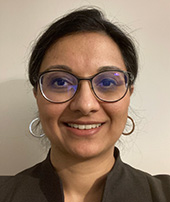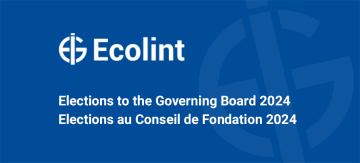Safia LADAK

| Children at Ecolint | La Châtaigneraie Primary |
| Nationalities | Canadian, French |
| Languages spoken | English, French, Kutchi/Gujarati, Hindi |
| Resident in the Geneva region since | 2008-2011; since 2022 |
Biographical Data
ORIGINS: Born in Tanzania; childhood in Tanzania then Canada; of Indian origin.
EDUCATION: BComm (Canada); MBA (France/Singapore).
PROFESSIONAL: Worked in strategy consulting, telecommunications, and non-profit sectors (the latter since 2008).
EXTRA-CURRICULAR: long-time community volunteer (e.g., currently teaching primary-aged children on weekends); sports (basketball, volleyball; learning to ski).
CURRENT ROLE: Director, Central Scholarships Unit, Aga Khan Development Network (AKDN).
What does Ecolint mean to you?
Developing the full potential of each and every child (through academics, sports, language, arts, nature and more).
Quality-driven safe, inclusive learning space for my children.
Opportunity to widen horizons through interaction with diverse backgrounds.
Trampoline into a future full of new opportunities and challenges.
What skills/expertise can you bring to the School?
Critical thinking. Strategic planning. Governance experience within complex organisations. Policy setting. Crisis management. Risk analysis. Stakeholder management. Global perspective. Financial resource mobilisation. Knowledge of education sector.
Understanding that the Governing Board focuses on long-range and strategic issues, and not specific management, personnel, or curricular issues, how would you support the Ecolint Mission if you were elected to the Governing Board?
Keep a keen focus on the Ecolint Foundation’s mission and its future trajectory. Support the Board effort on priorities such as: organisational resilience; strategic planning; financial sustainability; positioning in local and global marketplace; education outcomes for students; alumni engagement; safeguarding of stakeholders (e.g., students, staff, etc.).
The Ecolint Governing Board is the key governance body of the International School. What is your understanding of the tasks you are called upon to perform in this context? And, what particular skills and experience would you draw on to fulfil this role?
In my view, a board's top priority is to safeguard an organisation's mission and ensure the organisation's long-term sustainability. Over my career, I have held a range of advisory, operational and governance-related roles in multiple sectors. Moreover, since completing my MBA, I have worked in the non-profit sector for nearly two decades, first in global health, then in international development and now in higher education. I believe this mix of experience and skills will enable me to contribute to Ecolint’s Governing Board as I understand the dynamics between long-term governance, strategic planning and financial stewardship, performance management and accountability, and daily operational challenges.
Fair and equitable access to an education of excellence such as that of the International School of Geneva is at the heart of the objectives on which the Governing Board must focus. What might your thoughts be on this matter at this time? Do you have any particular expertise that you could draw upon in such societal matters?
In my view, fair and equitable access is difficult to balance vis-à-vis a fee-paying scheme that must be borne by households of varying income levels. In the case of the International School of Geneva, this balance can be improved through a range of interventions, including: a) student recruitment strategies that are inclusive, including scholarships and other forms of financial aid; b) fee structures that are aligned with fundamental financial objectives (e.g., financial sustainability, non-profit motive) and with student recruitment strategies; and, c) policies and practices that prioritise and reward diversity and inclusiveness.
Ecolint aims to ensure a framework that serves to provide a distinctive high quality international education through which all students are helped to develop their abilities to the highest level of the potential. In your opinion, what are the different elements that are critical to this framework (buildings, interior and exterior spaces; technical supports and equipment; management team, teachers, and administrative staff; or others...)?
In my view, there is no agreed definition of “high quality” education. Depending on the overall goals of a school system and the metrics it tracks, this definition can vary significantly. E.g., Is the goal to have all students graduate at the end of high school, or to ensure that all students receive admission into higher education, or to ensure that students score within a certain percentile of standardised tests, and/or something else. Having said that, I believe that several critical success factors underpin “high quality”, including (but not limited to): a) effective, caring teachers who can support each child’s learning journey; b) relevant, well-rounded curriculum and pedagogy that i) teach children how to learn and be resilient in a fast-changing world and ii) have clear/high expectations for what children should achieve; c) high-performing, adaptive management and governance structures that can steer the school system into the future; d) transparent measurement systems that track outcomes (and not just outputs) at all levels and across all functions; and, e) well-designed and well-maintained built environment that enables the learning and teaching goals of the school system.
Ecolint embraces diversity and honours the unique voice and personal experience of all members of the community. What do you think of this statement in terms of your experience as a member of the community? In your opinion what should be the role of the Governing Board in strengthening inclusion of diversity in the Foundation?
Diversity, or the concept of pluralism, is not universally comfortable. Moreover, diversity or pluralism (of views, skills and experiences) is an important success factor for high performance and problem solving across various settings and sectors. Thus, the ability to value, identify, nurture, and leverage diversity to achieve common goals is a distinctive skill, for staff and students. The Governing Board should itself encompass a wide range of skills and views, and it should encourage the same across all aspects of the Foundation. Concretely, this means that policies (across all functions at the school level and foundation level) should be reviewed and revised through a critical lens to ensure that they are indeed embracing diversity. The Board’s role will be to enable the Foundation’s management team to translate the notion of diversity into specific, time-bound targets to achieve a step change.
Are you aware of the financial information related to the Foundation? While efforts have been made, what else can be done in your opinion, to make the Foundation more sustainable in the long term continuing to ensure affordable fee structures while providing qualitative inclusive education in an effort to make global citizens and optimum capital development efforts?
Financial sustainability is a strategic imperative for school systems around the world. Moreover, financial sustainability is an ongoing endeavour in a complex and evolving landscape. Thus, financial sustainability requires a long-term, comprehensive financial strategy that balances market-leading/high-quality learning, alongside accessible fee structures for families, effective talent management and school administration, and pragmatic capital investments. In the case of the Foundation, current efforts to stabilise the financials are welcomed and should be encouraged as an ongoing priority for all stakeholders. All aspects of the Foundation’s financial health should be reviewed in a prioritised, phased manner. For example, there may be latent opportunities to enhance the revenue model (e.g., not necessarily by increasing fees or prices, but perhaps by increasing volumes) or finetune the cost base (e.g., by improving fixed asset productivity).
